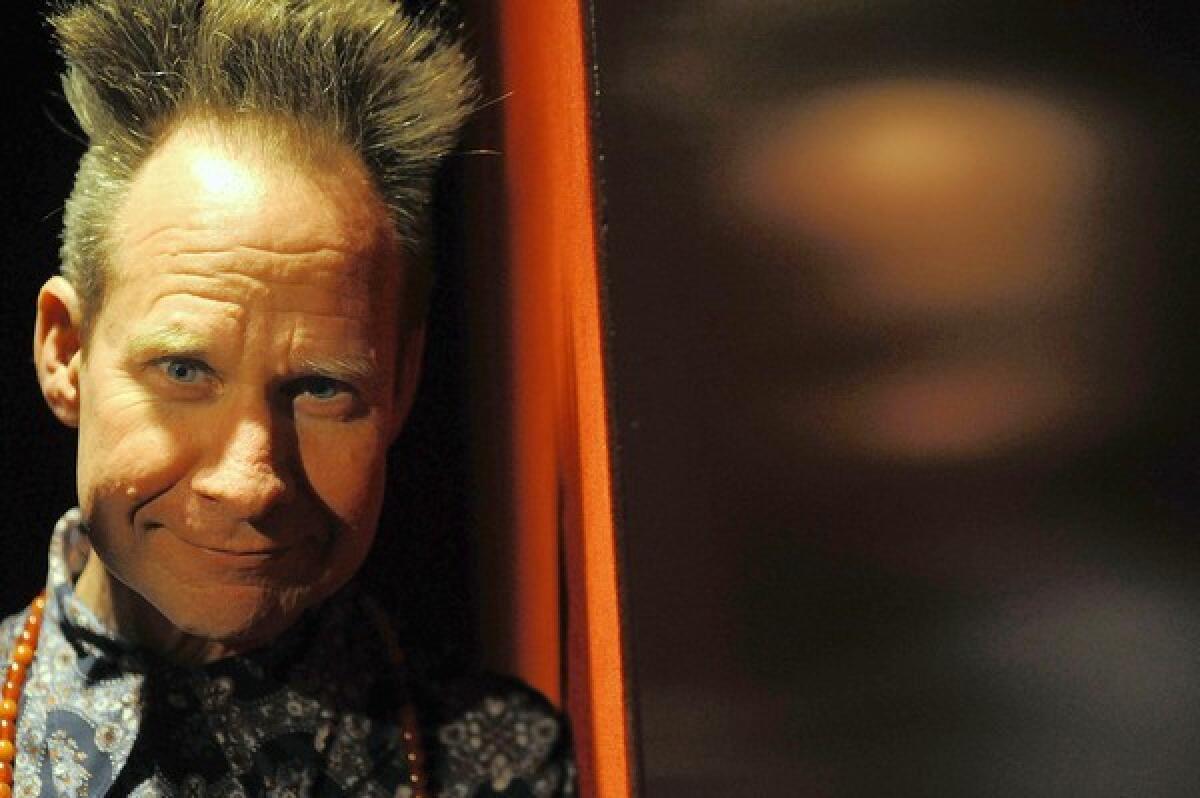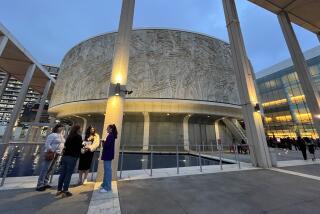At last, Peter Sellars will play at the Met

Watching Peter Sellars rehearse is to observe a man possessed. Last week at the Metropolitan Opera House, L.A.’s reknowned theater director was fine-tuning “Nixon in China,” which opens Wednesday. The new production of the John Adams opera, about the pre-Watergate president’s historic meeting with Chairman Mao Zedong in 1972, will mark, at long last, Sellars’ debut at the Met. It will be broadcast live in movie theaters worldwide Feb. 12.
Working on a scene in which Premier Chou en-Lai greets the Nixons in the Great Hall of the People, an ornate banquet room, Sellars raced across the stage like Puck, wearing a polyester shirt left over from “Starsky & Hutch.” In one fluid motion Sellars placed chorus members at precise points on the stage, instructed them how to toast with brio and reminded them of the musical cue that told them when to sit down. Clapping his hands, he spurred them through another run-through, exulting, “Seize the time, seize the day!”
In a quieter scene, as Pat Nixon (soprano Janis Kelly) was alone in her regal hotel room singing, “I come from a poor family, I treat each day like Christmas,” Sellars instructed her to make the hotel bed herself. Adams, who is conducting the opera and who has collaborated with Sellars for 25 years, was moved by the director’s suggestion. “It’s the sort of deeply imagined detail that makes Peter’s work so humane and separates him from almost all other directors who work in the operatic world,” he said.
What also separates Sellars, 53, from other directors is a sensibility best defined as Brecht meets Fellini with an essence of Buddha. And maybe a dash of Attila. “Peter has an extremely strong will and doesn’t negotiate on lots of things,” said Adams. “I can think of one general manager who wanted to produce one of my operas and the only thing he could say up front is that it wouldn’t be Peter Sellars.”
Adams wouldn’t say who that general manager was, though in 2008 it could have been Met general manager Peter Gelb. Then, in a decision Adams said resulted in “very, very hurt feelings,” Gelb chose British director Penny Woolcock over Sellars to helm Adams’ opera “Doctor Atomic.” Initially Sellars had been slated to direct, but Gelb felt Sellars’ original 2005 San Francisco Opera production was short on drama in the second act.
“I don’t remember all the steps along the way,” Gelb said, referring to his discussions with Sellars about changing “Doctor Atomic.” “But at a certain point we agreed it wasn’t going to work. There were different opinions about how to fix the second part.” But, Gelb added, “I have great respect for Peter’s work. What he’s done with ‘Nixon in China’ is masterful. It’s full of adventure and wit and sense of occasion. It’s one of the most brilliant things he’s done.”
After a rehearsal, Sellars plopped down in a red velvet audience chair in the Met for an interview. In conversation he does perorations on art with as much kinetic energy as he brings to directing. Personal questions, though, do have a tendency to bring him to a four-measure rest. Did in fact Gelb’s decision to go with another director for “Doctor Atomic” hurt his feelings?
Sellars frowned. “Uh, you know,” he said slowly. “Let 100,000 flowers bloom, to quote Mao.” He laughed. “There should be as many versions of ‘Doctor Atomic’ as there can be.” After all, he continued, “A weak piece of art is only what its creator thought it was. But with a great one, every generation finds new things. It has more to say, not less, over time.”
Plugging great art into current events has been Sellars’ modus operandi since he was a kid in Pittsburgh, when he concocted existential puppet shows with Harold Pinter plays. A rebel with a Dadaist cause at Harvard, he graduated to create productions of “The Marriage of Figaro” figuratively set in a swanky New York apartment and “The Merchant of Venice” in a racially taut Venice Beach.
Sellars’ politically charged productions have long caused opera critics to harrumph and English professors to scurry for the exits. Such is the fate of the provocateur. But in 2009 New York critics assailed his “Othello” at the Public Theater with such ferocity that if words were electric they would have made Sellars’ hair stand on end — that is, if it didn’t already. Sellars had to admit that one hurt.
With President Obama on his mind, Sellars transformed the James Earl Jones-ish Othello into a placid leader under assault from a regular-Joe Iago, played by Philip Seymour Hoffman. Sellars also changed the gender of a minor character to allude to the rape of women soldiers in today’s stressed American military — a theme he and soprano Dawn Upshaw will reprise on June 10 at the Ojai Music Festival in a production of new songs by contemporary composer George Crumb.
“When they hate you that much, and the vitriol is so out of proportion to what you are actually doing,” Sellars said of the critical reaction to “Othello,” “you see an exact mirror of the intemperate political climate we’re in right now. So I take the criticism as its own merit badge.”
Southern California audiences have experienced the 5-foot-4 Sellars’ oversized talents since 1990, when he arrived to direct the culturally diverse Los Angeles Festival. For years Sellars has taught a course called “Art as Moral Action” at UCLA and, “in one of the most important things in my life,” produced and promoted art with both inner-city kids and the skid row performance group Los Angeles Poverty Department, which he called “the most important theater company in America.”
In December, Sellars will join the L.A. Phil and another one of his favorite collaborators, conductor Esa-Pekka Salonen, to premiere “Orango,” a long-lost opera by Dmitri Shostakovich about the rise and fall of a Russian power broker who is part man, part ape. Sellars is currently dreaming up ideas for a semi-staged version of the opera’s prologue, in which the title character appears in a circus cage.
Sellars directed the premiere of “Nixon in China” at the Houston Grand Opera in 1987. In fact, the opera was his idea. In 1983, Sellars walked up to Adams at a New England music festival and said, “I’ve always wanted to meet you, would you like to do an opera called ‘Nixon in China’?”
Times music critic Mark Swed has described Alice Goodman’s libretto as one of “breathtakingly elegant and pointed formal poetry” and Adams’ score as “bursting with Minimalist invention, big band swing and an updating of operatic techniques.”
“We made ‘Nixon in China’ during the second Reagan administration, when there was a very intense freeze on the liberal voice in this country,” Sellars explained. “Where were the American values that stood for generosity, openness and a possibility for moving forward?”
Irony of ironies, progress could be found in the conservative’s trip to China. “It was intense to suddenly recognize one-fifth of the planet,” Sellars said. “What level of denial does it take to miss that? What does it mean to finally acknowledge something right in front of you? The power of that recognition is incredible. So the opera was hopeful in a difficult time.”
The years since the premiere of “Nixon in China” have brought forth one example after another of Nixon’s racism and Mao’s political murders. “All these revelations have added much more dimension to the opera than when we wrote it,” Sellars said. Accordingly he has given the Met production, through nuances in singing and acting, a darker hue than ever before.
“And how’s this for karma?” Sellars continued. “‘Nixon in China’ is coming together in the same week that China’s President Hu is visiting Washington. What’s at stake in the U.S.- China relationship has never been higher.”
At the same time, he said, America has never felt more adrift. “Everything fake is now labeled authentic. Guantanamo prison is called ‘Camp Justice.’ How does ‘justice’ mean justice again? How does ‘democracy’ mean democracy? The job of an artist is to take these words that have been poisoned and detox them, restore some shred of their real meaning and power.”
Sellars was proud and grateful, if not savoring a little revenge, to finally have the Met, opera’s grandest stage, to make his point. Thanks to live broadcasts, he said, “Nixon in China” “will speak across the country and world in a really powerful way. It’s the right moment for it. Again.”
More to Read
The biggest entertainment stories
Get our big stories about Hollywood, film, television, music, arts, culture and more right in your inbox as soon as they publish.
You may occasionally receive promotional content from the Los Angeles Times.






